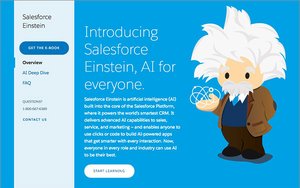Salesforce Reveals 'Einstein' Details, Becomes Less Theoretical
- by Jess Nelson , October 9, 2016
 SAN
FRANCISCO -- Three weeks after announcing its new artificial intelligence service, Salesforce provided more details about Einstein at its annual Dreamforce conference here this week.
SAN
FRANCISCO -- Three weeks after announcing its new artificial intelligence service, Salesforce provided more details about Einstein at its annual Dreamforce conference here this week.
Einstein’s presence was abundant at Dreamforce, with images of the company’s cartoon avatar (based off of the real-life Albert Einstein) littered across the venue’s Trailhead-themed design.
With the tag line “AI for Everyone,” Salesforce Einstein consists of an integrated set of AI technologies that deliver data insights, such as lead scoring or product recommendations, to Salesforce customers.
Salesforce CEO Marc Benioff introduced Einstein during his keynote address this week amidst a round of applause from attendees, stating that Einstein will be integrated into all of Salesforce’s sales, marketing, commerce and customer service products.
Shubha Nabar, director of data science at Salesforce, joined Benioff on the stage to explain how Einstein’s data process works. Einstein first collects and then processes data from email, calendar, social media and connected devices with machine-learning algorithms and language and image processors. Einstein then processes that data to discover patterns and make predictions about the future.
The large-scale machine-learning algorithms are built to maintain a unique predictive model that understands and anticipates user behavior. Marketing content, such as email promotions or mobile offers, is optimized to most likely generate a sale through predictive personalization.
“Marketers are always thinking about four things: audience, channel, timing and content,” says Meghann York, director of product marketing at Salesforce. She says Einstein helps marketers become better at promoting their brands by operating more efficiently and increasing conversion rates.
From an email marketing perspective, York describes how email content powered by Einstein populates dynamically when the email is clicked on rather than when it was sent. This way recommendations are more relevant, reflecting the last time the customer engaged with a company.
“Your last click is the best predictor of your next click,” says York, describing how in-Web recommendations also change in real-time according to what a customer is clicking on and searching for.
In addition, Einstein’s predictive sort feature can personalize search and sort results based on a customer’s preferences and individual behavior.
York says a lot of the marketers she has spoken to say that artificial intelligence frees up their time to do the stuff they enjoy the most, such as strategy and creative.
“It can only make their jobs better and more successful,” says York, recommending that marketers get on board sooner rather than later to take advantage of the opportunities machine-learning offers.
This is especially important considering that the greatest benefits of machine-learning algorithms can take two to three months to come to fruition, says York, because the machines need to take the time to learn. However, marketers can start right off the bat with geotargeting and personalized recommendations based off of top sellers.


